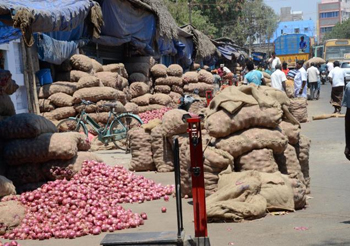 Malda, Nov 13: Like the ration riots that singed Bengal in 2007, anger over price rise seems to be spreading like wildfire. People looted three more weekly haats in Malda on Tuesday, triggering panic among vegetable traders who have threatened to call a strike unless they get police protection.
Malda, Nov 13: Like the ration riots that singed Bengal in 2007, anger over price rise seems to be spreading like wildfire. People looted three more weekly haats in Malda on Tuesday, triggering panic among vegetable traders who have threatened to call a strike unless they get police protection.
Those who looted Dharampur , Achintola and Balupur bazaars on Tuesday are ordinary people driven to desperation by the unbridled rise in vegetable prices. It's also an indication that the government has failed to restore confidence among buyers.
On Monday, villagers had looted the Sovanagar haat in Malda after a quarrel with potato sellers who refused to sell at the government rate of Rs 13 a kg. The fire spread to Dharampur with people ransacking stalls and running off with all the vegetables they could lay their hands on. The administration, which had brushed off the Sovanagar looting, tried to play down the Dharampur incident as well, calling it a mere scuffle between a seller and some customers . "Some potatoes and spinach were snatched, which was blown out of proportion ," said an official.
Traders reacted angrily, accusing the administration of being ignorant or deliberately suppressing the looting. While the blame-game was on, two more haats - Achintola and Balupur in Ratua - were looted. A worried administration has called a meeting on Wednesday.
Vegetables worth 4 lakh looted in Malda
The trigger in Dharampur was the same as Sovanagar - potato being sold at Rs 20. Newly harvested potato was selling for a whopping Rs 60 a kilo and onion at Rs 80. Even the humble kochu (yam) was priced at Rs 45 per kg and raw banana at Rs 5 a piece. To top it all, there was little of everything. People flew into a rage and started looting the market. Some sellers began to hide their goods but the frenzied mob snatched everything. Even bundles of spinach were torn from hand to hand. It was a free for all.
Police from Manikchak reached around 9.30am but there wasn't anything left. Traders alleged that vegetables worth Rs 2-3 lakh were looted. In Balupur and Achintola , the loss was Rs 1 lakh each. Worryingly, clashes broke out at Achintola, and police had to lathicharge the looters.
SP Kalyan Mukherjee said police are trying to hold negotiations to clear the "misunderstanding between sellers and buyers" . District magistrate G Kiran Kumar was not willing to acknowledge the lootings as "big incidents" . "They were blown out of proportion . We have already taken measures to keep prices in check and have opened two stalls in each block for selling vegetables. We have decided to convene a meeting between the administration, Malda Merchant Chamber of Commerce and police on the present unrest. Ministers will also be present in the meeting," Kumar said. Additional DM Nilkamal Biswas said BDOs have been asked to monitor the village haats personally.
Jayanta Kundu, secretary of Malda Merchant Chamber of Commerce, said, "The administration is sitting idle on the crisis of traders. Retailers and wholesalers are scared after a series of hooliganism. If this goes on we'll have to stop business in the district."





Comments
Add new comment